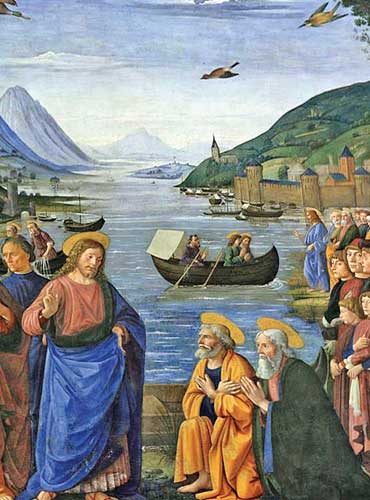Memorial of Saint Elizabeth Ann Seton, Religious – Jn 1:35-42
Today’s Gospel features a very brief conversation between Jesus and the disciples who come to follow Him. Although it’s short, those three phrases, “What are you looking for?,” “Rabbi, where are you staying?,” and “Come, and you will see,” offer us some profound insights into our vocation as religious.
“What are you looking for?”: The Greek word used for looking is stronger than just a looking around for something to do to kill time. It means to investigate, to try to get to the bottom of something, to seek in order to find something final and definite. Christ is asking these disciples what their lives are about, what is it they seek with all their hearts: they could be looking for money, for power, for influence, for an escape . . . or for salvation and to do the will of God.
Their reply, “Rabbi, where are you staying?,” shows us two things: first, in addressing Christ as “Rabbi,” they show that they had already accepted Christ as their model and master. They weren’t simply curious; they really wanted to learn from this Teacher. Secondly, their question can also be translated as, “Where do you live?” or “Where do you remain?” In other words, they want to know where Christ can always be found; they want to abide with Him and remain with Him.
Aquinas, explaining Christ’s answer, comments, “Come and see, because the dwelling of God, whether of glory or grace, cannot be known except by experience: for it cannot be explained in words. . . . And so Christ says, “Come and see”: Come, by believing and working; and see, by experiencing and understanding.” Draw near to Christ through belief and deeds, and you will see by experience and understanding where Christ remains.
This dialogue must repeat itself in our lives: time and time again, especially in moments of trial or difficulty, Christ asks us, “What are you looking for?” We must seek God, and His dwelling among us, especially as revealed in His Will. Only by embracing His will for us can we come and see where He remains, and remain there ourselves.
Elizabeth Ann Seton, the “first flower in the calendar of American saints,”[1] put into practice this aspect of the Gospel. She referred to God’s will simply as “The Will,” and her acceptance of it was one of the most notable aspects of her spirituality: in the homily for her canonization, Blessed Paul VI emphasized that “a Saint is a human creature fully conformed to the will of God.” “A Saint is a human creature fully conformed to the will of God.” As Seton wrote in a conference to her spiritual daughters, in today’s office of readings, “What was the first rule of our dear Savior’s life? You know it was to do his Father’s will. Well, then, the first end I propose in our daily work is to do the will of God; secondly, to do it in the manner he wills; and thirdly, to do it because it is his will. I know what his will is by those who direct me; whatever they bid me do, if it is ever so small in itself, is the will of God for me. Then do it in the manner he wills it, not sewing an old thing as if it were new, or a new thing as if it were old; not fretting because the oven is too hot, or in a fuss because it is too cold. You understand — not flying and driving because you are hurried, not creeping like a snail because no one pushes you. Our dear Savior was never in extremes. The third object is to do his will because God wills it, that is, to be ready to quit at any moment and to do anything else to which you may be called.”
Let us pray, through the intercession of Elizabeth Ann Seton and Mary, Mother of God, for the grace to embrace God’s will as they did, and so come and see where Christ remains.
[1] Cf. Homily for her Canonization, Paul VI.






